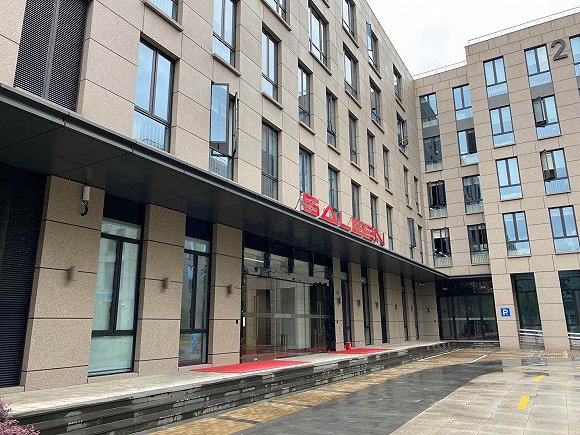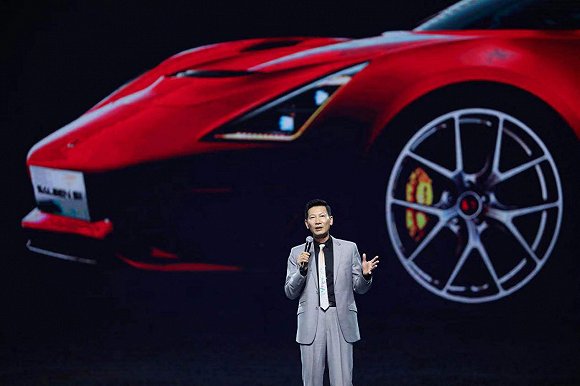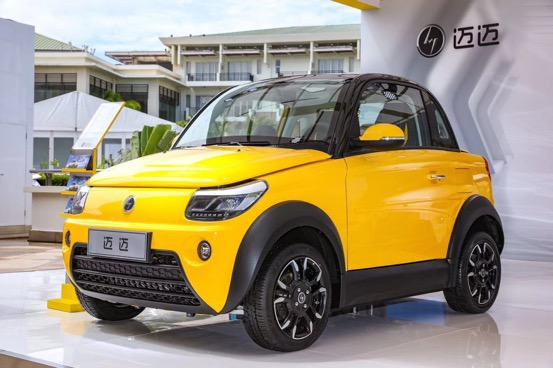With only seven cars sold this year and a CEO on the lam, Saleen China is parked up on the emergency lane, waiting to be towed away.

By HOU Zhuokai
Translated by GU Yiwei
As we tried to get into Saleen’s premises on the Bund in Shanghai, the security guard shouted: “No point knocking! The company’s bankrupt! Everyone is gone!”
Launched with much pomp and spectacle in November 2019, the showroom claimed to offer an immersive experience into legendary race-cars and supercars. It is now a dark and empty testament to a deal that looked strange from the beginning. A Saleen Maimai, a new model much mocked for its cartoonish appearance, remained on stage.
No Saleen employee was to be found. A cleaning record showed that the showroom has been closed since June 23. Open for only eight months, the showroom was the shortest-lived tenant at the most prestigious address in Shanghai. The building manager said the showroom had been seized by the district court. “Everything needs to be out by the end of July.”
We went to Saleen’s headquarters in Jing’an District. It was around noon and people were pouring out of the buildings for lunch. The sprawling campus is divided into two, one for exhibits and the other for offices. There are seizure notices at every entrance. When asked if they worked for the company, passersby either demurred politely or simply walked away. A small group was overhead discussing resignation and job hunts.

Jiangsu Saleen Automotive Technology rose to fame on the back of flamboyant publicity stunts and is now deep in trouble. After the Maimai tanked last year, allegations of fraud arose and ravenous creditors circled. In May, after the company’s former lawyer exposed the business’s murky technology, ownership and financing, bank accounts were frozen, leaving hundreds of workers unpaid. The trouble, however, started well before that.
“I have to leave. I have to survive.”
Xiao Yue recently left Saleen. She said the company stopped paying benefits in February when the COVID-19 outbreak started, and in May all salaries went unpaid. Now the landlord has issued an eviction notice telling JSAT to move out by July 15.
“I gave up three other job offers to work here, just last year! I thought, wow, cutting-edge technology! Deep pockets! Who would have thought?”
She was not the only mug. JSAT was formed in 2016 when Jiangsu Secco threw a lifeline to financially beleaguered Saleen. Jiangsu Secco owns a third of JSAT’s shares, with the rest owned by a handful of entities controlled by Charles Xiaolin Wang, chairman and CEO of JSAT.

Government incentives and enormous capital injections allowed the new company to almost immediately invest 17.8 billion yuan (US$2.5 billion) in a “world-class” factory. Soon after, JSAT acquired 4 billion yuan and invested in a “slightly smaller” factory nearby.
When the Shanghai campus opened in early 2019, local job boards were flooded with JSAT posts. The pay was good, even for non-tech positions. “The benefits were the same as other rising tech companies. The salaries for some hot positions were even twice or three times higher.” Xiao Yue said. “Some of my ex-coworkers even quit their jobs at other car companies to join.”
In the year that followed, JSAT spent heavily on wasteful headline-making events. High-profile fanfares such as the Shanghai showroom and the grand launch ceremony at the Bird’s Nest stadium in Beijing, all felt reassuring. The company was getting attention, although not always in a good way.
JSAT debuted five models, including an SUV that was intended to compete against the Porsche Macan. What drew the most attention was an electric vehicle called the Saleen MaiMai. The company touted it as an “urban vehicle with the genes of a race-car”, claiming that the design was conceived by Giorgetto Giugiaro — “Legendary car designer who created many classic models of Ferrari and Maserati”— and that Steve Saleen, the mastermind behind the brand had “fine-tuned its engine and electric system himself.”
“The company had high expectations for the MaiMai.” Xiao Yue said. Priced at about 160,000 yuan, it’s almost twice as expensive as mature models of other electric urban vehicles sold in China. Almost a year after its debut, a total of 27 MaiMais had been sold, only 7 in 2020.
MaiMai, as it turned out, is a revamped version of Mycar, a tiny two-seater electric low-speed vehicle (LSV) designed for congested urban settings. Often dubbed “golf carts”, it wasn’t well received when it was first launched around 2010, and the technology was soon acquired by Charles Wang from its Hong Kong based developers for US$20 million.
When the revamped version was unveiled ten years later, it was met with mockery and disbelief. “What a naive design!” one car critic commented. Even the security guards couldn’t stop smirking.

Charles Wang, however, remained steady. “Automakers must meet the needs of the new era, starting from body designs,” Wang said.
Xiao Yue said that two other models were supposed to hit the market later this year. “The boss flew to America a few times last year to find suppliers and plan for production. To my knowledge, it’s pretty much all set over there.”
A prototype of the Saleen Mac is on display on the Shanghai Campus and looks almost ready for production. Our investigation found that contrary to JSAT’s claim that the Saleen MAC was “independently developed with proprietary race-car technology,” only the electric system and body design come from in-house teams. Qiao Yudong, JSAT’s former legal counsel, recently denounced the company for defrauding investors and the government of millions of dollars. He also questioned the ownership structure — four entities controlled by Wang owns two-thirds of JSAT shares — calling the company a money-swindling scheme.
“Wang is very smart and very socially versatile,” a former employee said. “But above all these, he is an extremely good storyteller. That’s maybe why he is where he is today.”
At least he has told a good story about himself. His social media profiles are laden with titles, honors, and hyperboles such as “top Wall Street attorney” and “Chinese-American business leader.” Despite the publicity, very little is known about his background. In fact, no one is sure of his whereabouts either. In an interview in May, he told a domestic media outlet that he had been working on certification for Saleen’s new models and will remain in the US indefinitely.
JSAT employees have given up all hope. The scorched financial earth he left behind is not going away. Jiangsu Secco said on June 30 that the company will take steps to pay salaries and benefits for those who agree to resign. Those who refused to resign have the option of working from the nearby secondary campus, but it also has overdue rent and the company could be evicted at any time.
“Jiangsu Secco will make every effort to protect the rights of JSAT’s employees,” a company statement said. “Beyond backpay, the company is not able to make any further promises.”
For the employees who have been on an emotional and financial rollercoaster, there isn’t much to ask for. Nantong Jiahe Chemical, the only state-owned shareholder of JSAT, has called the police after finding “evidence supporting the allegation of Wang’s falsification of supporting documents, and embezzlement.”
In response, Wang said on WeChat on July 3 that he had gone “back to my good old business as a lawyer and a law professor.”
Three days ago, he sent an internal memo to employees, saying that the drastic collapse of the company was persecution, plotted by Jiahe and some local officials, but named no one.
The memo said nothing about when he would return.
(Xiao Yue is an assumed name)